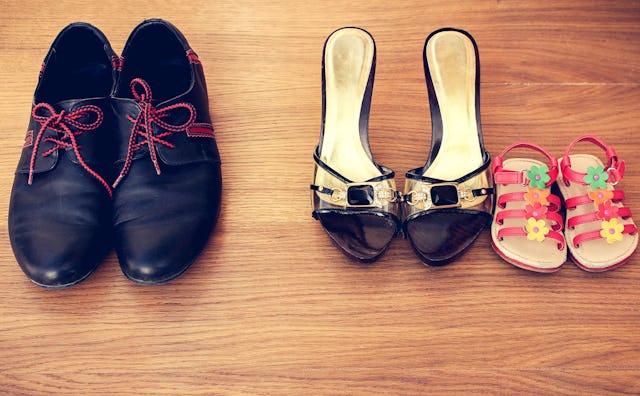Why Staying Together For The Kids' Sake Isn't Doing Them Any Favors

Here’s one thing almost everybody argues about: how to make it easier on the kids. And if you’re getting divorced, you have to accept that no matter what you do, even if you manage the least contentious divorce in human history, it isn’t going to be easy on the kids. Period.
Serge Bielanko wrote a moving, eloquent piece on Babble about the emotional impact of a failing marriage. “All we were after a decade of marriage and kids and confusion and sadness was two locust shells waiting for the wind to blow us away,” he says, and you get it, you see it; these people shouldn’t be together anymore. He talks about how he thought about staying together for his kids’ sake, but eventually realized that living a false life wasn’t the answer.
I agree with him, I do. But what he didn’t touch on, maybe because he didn’t realize it, is that staying together for the kids isn’t actually doing them any favors.
My parents split up when I was 8, and got divorced a few years later. This was in the early 1970s, and there weren’t any other divorced parents at my school, certainly none that I knew about. Since then it has become a lot more common, and many of my contemporaries have divorced parents, or are now divorced themselves, and some of my kids’ friends have divorced parents as well. Even my husband was divorced; I’m his second wife, a term that sounds really strange when I say it.
So here’s what I know about divorce, having grown up with it and seen a lifetime of people struggling to make it as bearable as possible: Don’t stay together for the kids. Just like you, they need to move on and into their new lives. The sooner the better, in fact, if it’s really and truly over.
You want your children to grow up and find love with the right person and live happily ever after, right? Maybe you want it for them right away, maybe you want them to plunge into wild affairs and experience more before it happens, but I think most of us want our children to find themselves with someone they can love for better or worse, ’til death do they part. And we want them to be happy in those unions, in whatever form they take. So how can it help them to live in a house driven by a marriage that isn’t working anymore? What are they going to learn from it? The air gets colder, and all that effort to make things better for them goes sour. All those negative emotions may hide beneath the surface, but they can feel them, every single day.
What does help them is seeing us, their parents, in healthy relationships. They shouldn’t grow up in a house with people pretending to love each other, or worse, people who can barely be civil to each other. They shouldn’t think that’s what marriage is, that love is settling for an uneasy truce. Let them see that romance is worth having, and true love worth taking risks for. If you’re the parent who has to move out and give up the day-to-day life you’re used to having with your kids, you can still show them you love them, and still be in their lives, and do it without living a lie—and making them think that’s what they should do, too. Life is living, and progress, and as much as it hurts, they need to move on as much as you do. If you can’t do it, they can’t either, and then you all stay stuck.
I believe in marriage. I believe that when you make that commitment, it’s your duty to nurture it and fight for it, to do everything you can to keep it from falling apart. And sometimes, it falls apart anyway. When the marriage is over—and sometimes it just is—then everyone needs to move on, including your children. It’s the healthiest thing you can do for them. You can show them that you are worthy of love, and they’ll know that they are too. You can show them that there’s hope for a happy future even when things have gone wrong. Staying together for your kids’ sake is making them your jailer, and they won’t thank you for it.
This article was originally published on